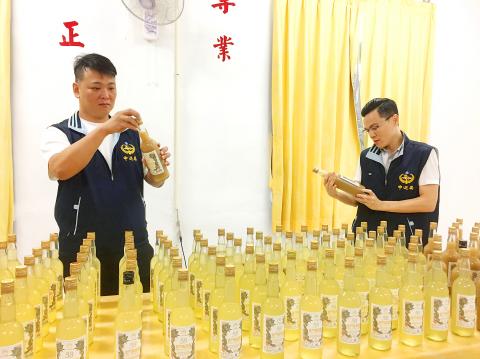Illegal animal vaccines from China repackaged and disguised as liquor were seized at Kinmen Airport, Council of Agriculture (COA) officials said yesterday.
It was the first time such a great quantity of banned veterinary vaccines has been intercepted at the border, Bureau of Animal and Plant Health Inspection and Quarantine Deputy Director-General Shih Tai-hua (施泰華) said.
A person at the airport appeared to be carrying 18 boxes of Kinmen kaoliang liquor to Taiwan, but a leak in a damaged box did not smell like alcohol, which alerted the airport police, the council said.

Photo: CNA
The person admitted the actual liquid in the bottles was a duck vaccine they had smuggled from China, but did not clarify what disease the vaccine was for, officials said.
Local media reported the vaccines to have been for avian influenza, but Shih denied this.
The substance is to be analyzed by the council’s Animal Health Research Institute and results are expected in a week, he said.
In Taiwan, poultry with avian flu is culled immediately, he said, adding that the council bans the use of vaccines on infected poultry.
Police seized a total 240 liters of vaccines, enough for 300,000 ducks, Coast Guard Administration Kinmen Mobile Investigation Team Deputy Chief Hsu Yu-sheng (許育勝) said.
Vaccines should be stored between 4°C and 8°C or they could spoil, but the smuggler did not use any refrigeration, Kinmen Bureau of Animal and Plant Health Inspection Director Wen Shui-cheng (文水成) said, adding that some bottles contained dead flies.
Spoilt vaccines could give rise to new viruses and if animals were to be administered such vaccines, the consequences would be unimaginable, Wen added.

Taiwan would welcome the return of Honduras as a diplomatic ally if its next president decides to make such a move, Minister of Foreign Affairs Lin Chia-lung (林佳龍) said yesterday. “Of course, we would welcome Honduras if they want to restore diplomatic ties with Taiwan after their elections,” Lin said at a meeting of the legislature’s Foreign Affairs and National Defense Committee, when asked to comment on statements made by two of the three Honduran presidential candidates during the presidential campaign in the Central American country. Taiwan is paying close attention to the region as a whole in the wake of a

Chinese Nationalist Party (KMT) Chairman Eric Chu (朱立倫), spokeswoman Yang Chih-yu (楊智伃) and Legislator Hsieh Lung-chieh (謝龍介) would be summoned by police for questioning for leading an illegal assembly on Thursday evening last week, Minister of the Interior Liu Shyh-fang (劉世芳) said today. The three KMT officials led an assembly outside the Taipei City Prosecutors’ Office, a restricted area where public assembly is not allowed, protesting the questioning of several KMT staff and searches of KMT headquarters and offices in a recall petition forgery case. Chu, Yang and Hsieh are all suspected of contravening the Assembly and Parade Act (集會遊行法) by holding

PRAISE: Japanese visitor Takashi Kubota said the Taiwanese temple architecture images showcased in the AI Art Gallery were the most impressive displays he saw Taiwan does not have an official pavilion at the World Expo in Osaka, Japan, because of its diplomatic predicament, but the government-backed Tech World pavilion is drawing interest with its unique recreations of works by Taiwanese artists. The pavilion features an artificial intelligence (AI)-based art gallery showcasing works of famous Taiwanese artists from the Japanese colonial period using innovative technologies. Among its main simulated displays are Eastern gouache paintings by Chen Chin (陳進), Lin Yu-shan (林玉山) and Kuo Hsueh-hu (郭雪湖), who were the three young Taiwanese painters selected for the East Asian Painting exhibition in 1927. Gouache is a water-based

President William Lai (賴清德) has appointed former vice president Chen Chien-jen (陳建仁) to attend the late Pope Francis’ funeral at the Vatican City on Saturday on his behalf, the Ministry of Foreign Affairs said today. The Holy See announced Francis’ funeral would take place on Saturday at 10am in St Peter’s Square. The ministry expressed condolences over Francis’ passing and said that Chen would represent Taiwan at the funeral and offer condolences in person. Taiwan and the Vatican have a long-standing and close diplomatic relationship, the ministry said. Both sides agreed to have Chen represent Taiwan at the funeral, given his Catholic identity and